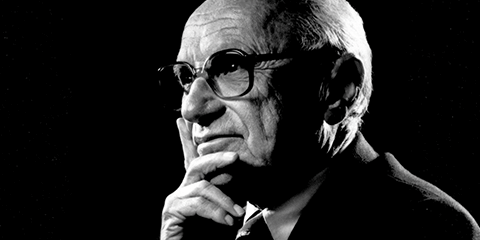
"There's no such thing as a free lunch," said Milton Friedman, who won the Nobel Prize in Economic Sciences in 1976. Though this quote isn't originally his, credit goes to him for popularising it in economics. Friedman was talking about opportunity cost when he said it. Friedman is best known for monetarism. Monetarism means adjusting the money supply to balance inflation and growth. When the RBI governor ups and downs interest rates, he is actually using the principles of monetarism. Friedman is not only among history's most influential economists, his theory was also counter to Keynes', another heavyweight in economics. We have compiled below some quotes from Friedman. Friedman was not only a free-market advocate, he also warns about government's intervention in the economy. Some of his insights are simple yet remarkable. And perhaps many of us will find the last quote quite controversial.
Sceptic of government intervention and policy
- The government solution to a problem is usually as bad as the problem.
- Only government can take perfectly good paper, cover it with perfectly good ink and make the combination worthless.
- Nothing is so permanent as a temporary government program.
- Many people want the government to protect the consumer. A much more urgent problem is to protect the consumer from the government.
- The world runs on individuals pursuing their self interests. The great achievements of civilization have not come from government bureaus. Einstein didn't construct his theory under order from a bureaucrat. Henry Ford didn't revolutionize the automobile industry that way.
- Most of the energy of political work is devoted to correcting the effects of mismanagement of government.
- Governments never learn. Only people learn.
- If you put the federal government in charge of the Sahara Desert, in five years there'd be a shortage of sand.
Free-market supporter and pro-capitalist
- Underlying most arguments against the free market is a lack of belief in freedom itself.
- Nobody spends somebody else's money as carefully as he spends his own. Nobody uses somebody else's resources as carefully as he uses his own. So if you want efficiency and effectiveness, if you want knowledge to be properly utilized, you have to do it through the means of private property.
- The problem of social organization is how to set up an arrangement under which greed will do the least harm. Capitalism is that kind of a system.
Insights
- Inflation is taxation without legislation.
- Most economic fallacies derive from the tendency to assume that there is a fixed pie, that one party can gain only at the expense of another.
- The most important single central fact about a free market is that no exchange takes place unless both parties benefit.
- When everybody owns something, nobody owns it, and nobody has a direct interest in maintaining or improving its condition.
- One of the great mistakes is to judge policies and programs by their intentions rather than their results.
- If all we want are jobs, we can create any number. For example, have people dig holes and then fill them up again, or perform other useless tasks. Work is sometimes its own reward. Mostly, however, it is the price we pay to get the things we want. Our real objective is not just jobs but productive jobs - jobs that will mean more goods and services to consume."
Controversial
- I'm in favor of legalizing drugs. According to my values system, if people want to kill themselves, they have every right to do so. Most of the harm that comes from drugs is because they are illegal.
